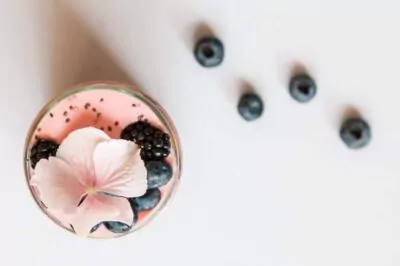Table of Contents[Hide][Show]
You walk into your local grocery store, ready to find the usual items on your grocery list. You scan the aisle endcaps, checking for the latest deals. To your delight, your favorite gummy snack is on sale. The advertisement reads, “Sour Garden Kids – 1lb Bag for $1.99”. This is a great deal, the regular price is $6.00 for a bag this size. You throw a bag into your shopping cart and keep shopping.
But what if the advertisement read, “Sour Garden Kids with Red #40 made from coal tar, linked to oral tumors in rats – 1lb Bag for $1.99”. Would you be eager to continue snacking on these? Probably not.
what’s really in our food?
If advertisers were honest about every ingredient or substance contained in the food we purchase, the likelihood of us purchasing those items would reduce drastically. The vast majority of consumers will not take the time to read all of the ingredients listed, nor will they be aware of the possible harmful effects of each ingredient.
Most of us lead busy lives and may not have the time needed to do the necessary research. And, we trust that those entrusted with the task of keeping our food supply safe, will actually do so. These harmful ingredients are hidden in plain sight.
hidden dangers of pesticides
You might be saying to yourself, “I don’t make these kind of purchases, so I’m okay.” That may not necessarily be true. Eating whole foods is a great way to knowingly avoid unrecognizable ingredients in our food, and get more nutritional value from each meal. The downside? Farming practices and the use of pesticides on our produce.
There are methods for washing pesticides from produce that can be effective for removing some of the toxins, but traces are often left behind. For produce with edible skin, or no protective rind, washing is irrelevant due to the pesticides being absorbed into the fruit or vegetable. This is especially true since pesticides remain in the soil for extended periods of time, depending on weather conditions and frequency of spraying.
How Your Conventional Produce Could Be Affecting Your Hormones
(and why we have gone organic)
Pesticides are responsible for a variety of health related issues, and many are related to our endocrine (hormone secretion) system. The Mayo Clinic states, “The body’s endocrine system includes the pancreas, the thyroid, parathyroid, pineal, hypothalamus, adrenal and pituitary glands, and the ovaries and testes. It also involves many other organs that respond to, modify or metabolize hormones.”
Going back to what our mention of chemicals “hiding in plain sight”—most of the produce found in conventional grocery stores is visually appealing.
But did you know the wax used to create the sleek shine on the skin of many of our favorite apples could be home to a number of toxins?

Hormone Disruptors Found on Our Produce
The EU compiled a list that contains 50+ endocrine disruptors, more than half are found in pesticides currently used in the US. There are endocrine disruptors, including those found in pesticides that aren’t included on this list due to when the study was done.
This list should not be viewed as complete. But it is a good resource for familiarizing yourself with the names of these chemicals you may have been, or are currently being exposed to.
These are just a handful of chemical ingredients contained within pesticides, and a few health issues linked to them:
Atrazine
This is lab created weed killing herbicide that is commonly used on farms. This chemical typically enters the bloodstream through the skin and lining of the stomach and intestines, via the water supply and consumption of produce.
Related health issues:
Malfunctioning reproductive organs, preterm births, and birth defects.
Glyphosate
An herbicide used to ripen fruit regulate plant growth. It can be used on a great variety of crops. It pass through our skin easily and needs to be ingested.
Related health issues:
Developmental disruption, reproductive disorders, and “probably carcinogenic” according to the CDC.
Dichlorophenoxy Acetic Acid (2,4-D)
This herbicide is a growth regulator that alters the the growth pattern of cells within a plant, ultimately killing them.
Related health issues:
Thyroid dysfunction, negative effects on sex hormones and reproduction organs.
Maneb
Used to prevent the damage of crops, this fungicide is used in the field and to preserve and protect the crops that have been harvested deteriorating in storage and during transport.
Related health issues:
Negative effects on the kidneys and central nervous system, and neuropsychiatric disorders.
Paraquat
This a herbicide used to kill/control the growth of grass and weeds. Enters the body via the skin ingestion of food and water.
Related health issues:
Kidney failure, heart failure, and esophageal restriction.

Common Conditions Due To Hormone Disruption
There is a laundry list of of condition caused by the endocrine disrupting chemicals in pesticides. Research on the subject is extensive, and it provides a clear perspective of the dangers of pesticide use.
Hashimoto’s Disease
Hashimoto’s Disease is a condition in which your immune system attacks your thyroid, a small gland at the base of your neck, below your Adam’s Apple.
The thyroid gland is part of your endocrine system, which produces hormones that coordinate many of your body’s functions.
Hypothyroidism
Hypothyroidism (underactive thyroid) is a condition in which your thyroid gland doesn’t produce enough of certain important hormones.
Thyroid Cancer
Thyroid cancer occurs in the cells of the thyroid. It’s especially detrimental, as your thyroid produces hormones that regulate your heart rate, blood pressure, body temperature and weight.
Hypoglycemia
Hypoglycemia is a condition caused by a very low level of blood sugar (glucose), your body’s main energy source.
Effects on children
The World Health Organization has a compiled a list of possible developmental effects of endocrine disruption in children.
Benefits of Going Organic
The benefits of eating organic outweigh eating conventionally grown food. Not only does your skin, body, and health benefit from organic food, but so does the environment.
1. Less harmful Pesticides and Chemicals
Even though some synthetic pesticides are used, they are not made of the same chemical composition of non-organic growers. They are created from naturally sourced ingredients, so the residues do not remain on our produce. Additionally, no preservatives are used.
benefits of lowering your pesticide exposure
Not using preservatives allows for the food to go through its natural decomposition process sooner, giving you an honest timeline for the food’s freshness.
The less chemicals entering the body, the more you reduce your chance of developing health related issues associated with hormone disruptors.
Not to mention, less chemicals are better for the environment!
2. Higher Nutritional Value From Food
The jury is still out on this bit of research. But in a study prepared by the EU Parliament, it is stated that, “There are also other, though minor, advantages of organic food, such as higher contents of some nutrients, and less cadmium, but they are not of sufficient importance to guide food choices.”
There was research study done on onions that stated a higher antioxidant levels in organically grown onions. For meat, the study also found nutrient levels of organic meat were approximately 50% higher, non-organically raised livestock.
3. Fewer Developmental Health Risks
The population who seems to be getting hit the hardest by the effects of pesticides are children. There are a large number of studies that find a correlation between ingesting pesticides and developmental delays and disorders.
Reports vary based on the age group of the children. A few include information regarding babies receiving hormone disruptors via breastmilk, and the long term effects of these chemicals The overwhelming common thread in these studies – avoid certain pesticides when able.

If you can’t go organic, don’t fret
For some of you reading this, I recognize going organic may not be a simple task. In many ways, it’s a luxury not afforded by everyone. If this applies to you, there are steps you can take to minimize your pesticide intake.
Minimizing Pesticide Risk
ALWAYS thoroughly wash your fruits and vegetables, even those with a rind. There are a number of wash recipes online, most include the use of white vinegar. If you are able to visit a local farmer’s market, but direct from farmers and ask about their farming practices.
Also, try and locate urban farming collectives in your city, they can be a great resource for locating and growing organic produce. Lastly, if have the space, grow your own food. It’s such a rewarding experience, and your food will be truly organic.
Sources
https://pubs.acs.org/doi/abs/10.1021/acs.jafc.7b01352
http://ec.europa.eu/environment/chemicals/endocrine/strategy/substances_en.htm#priority_list
http://ec.europa.eu/environment/archives/docum/pdf/bkh_annex_13.pdf
https://ec.europa.eu/health/endocrine_disruptors/process_en
https://www.nal.usda.gov/
https://ntp.niehs.nih.gov/ntp/roc/content/profiles/cresidine.pdf
http://npic.orst.edu/factsheets/half-life.html
https://www.sciencedirect.com/science/article/pii/S1631069117301300
https://www.ncbi.nlm.nih.gov/pmc/articles/PMC3945755/
https://www.nejm.org/doi/full/10.1056/NEJMra0804635
https://academic.oup.com/jcem
https://www.worldcat.org/title/endocrine-reviews/oclc/818904955&referer=brief_results
https://www.potatoesincanada.com/news/proposal-to-ban-mancozeb-fungicide-use-on-potatoes-underway-30138
https://archive.is/IWwS2
https://archive.is/y4Dx2
https://www.ccohs.ca/oshanswers/chemicals/endocrine.html
https://endocrinology.medicine.ubc.ca/endocrine-conditions/pituitary-disorders/
https://www.ncbi.nlm.nih.gov/pmc/articles/PMC3220783/
https://www.ewg.org/research/dirty-dozen-list-endocrine-disruptors
https://www.epa.gov/endocrine-disruption/what-endocrine-disruption#chemicals
https://www.ncbi.nlm.nih.gov/pmc/articles/PMC3572204/
https://pdfs.semanticscholar.org/90e8/9433ce49e9c9fe09a93096d43816336a951c.pdf
https://www.who.int/ceh/risks/cehemerging2/en/
https://www.mayoclinic.org/
http://apps.who.int/iris/bitstream/handle/10665/78102/WHO_HSE_PHE_IHE_2013.1_eng.pdf?sequence=1
http://apps.who.int/iris/bitstream/handle/10665/75342/9789241503761_eng.pdf?sequence=1
http://time.com/4871915/health-benefits-organic-food/
https://pdfs.semanticscholar.org/9669/2ea733aef38ef6c83d29e51b5e3e5751d14b.pdf
https://www.ncbi.nlm.nih.gov/pubmed/25771128
http://wssroc.agron.ntu.edu.tw/note/Paraquat.pdf
https://www.ncbi.nlm.nih.gov/pmc/articles/PMC3443608/
https://www.ncbi.nlm.nih.gov/pmc/articles/PMC1524969/
https://www.consumerreports.org/cro/news/2015/04/more-concerns-about-glyphosate-herbicide-residues-in-produce/index.htm
https://www.theatlantic.com/health/archive/2012/02/agent-orange-in-your-backyard-the-harmful-pesticide-2-4-d/253506/
https://www.cdc.gov/niosh/ipcsneng/neng0173.html
https://emergency.cdc.gov/agent/paraquat/basics/facts.asp
https://www.mayoclinic.org/departments-centers/endocrinology/sections/overview/ovc-20392506
https://pubs.acs.org/doi/abs/10.1021/acs.jafc.7b01352








Have you made the switch to organic produce? What are your thoughts on organic vs conventional? Opening the comments up for discussion!